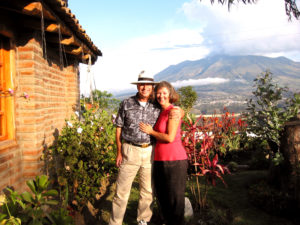
By Akaisha Kaderli
Special to the Financial Independence Hub
In preparing for a retirement overseas, we would wager that most people occupy themselves with the practical concerns of residential visas, banking, owning property, finding a doctor they like, medical care that they can afford and dealing with any language barriers. These are pragmatic matters with realistic solutions, and we say that these areas are almost the easiest part of making this lifestyle change. While the above mentioned topics are important and must be solved, we want to share with you what it really takes to move overseas.
It may surprise you, but what we have seen take people down, destroying their retirement dreams and sometimes even their marriages, are the emotional and psychological challenges one faces in adjusting to their new lifestyle overseas.
How do you prepare for these obstacles ahead of time? We hope the following tips and insight will shed some light on the topic.
Just like home, only cheaper

Many people trip themselves up with their giddiness over the fantastic cost of living in their new location. They often come into a new country talking themselves into believing that living in their new destination is just like home, only cheaper. We want to tell you that no place overseas is just like home. Customs, foods, weather cycles, housing codes, the treatment of pets, the laws, the language, cobblestone streets and workmanship quality are all different.
We have seen folks love the quaintness of their new town but then fall apart because they can’t find parking near to markets where they shop. Their charming town might not have one-stop-shoping with a parking lot tying several stores together so they find that market day involves stopping in six locations, perhaps fighting traffic in between. Instead of taking their time to enjoy their enchanting town, they find this situation to be annoying and they carry the frustration with them all day.
Culture and customs
Animals are treated as animals in developing nations and not as family members. Street dogs are common and if your heart is easily broken, then this might pose a problem for you. While we have seen Expats adopt up to a dozen dogs as pets, this is not something we would recommend. One could become involved in animal rescue, retraining and home placement but even that will not solve an issue that is culturally so different than what one is used to “back home.” We urge you to become involved as you feel comfortable, but then there will have to be a certain level of acceptance of the situation or you will be miserable. Resisting cultural differences is a never-ending battle that really isn’t satisfying.

The lackadaisical attitude of workers could drive you up the wall with them telling you they will come tomorrow to fix something and instead, show up several days later. Finding just the right maid, gardener or plumber could take some extra effort on your part. Once again, if your personality tends to the uptight and precise view of things, life in a foreign country could be a continuous challenge. It’s really much better for your health and for getting things done to just roll with the flow of it all. Ask other Expats which plumbers, electricians, gardeners, attorneys, construction workers and maids they would recommend and start with them first. There is no point in getting yourself upset and then holding this tension as a permanent posture towards life.
Flexibility of mind and attitudes
One of the best tools in your toolbox is having flexibility of mind. A friend of ours says the difference between an ordeal and an adventure is attitude, and it’s true. If you are finding that your blood pressure is rising because a sense of timing is different in your newfound county than it was back home, take a deep breath. Step back. Enjoy what this new lifestyle has to offer and realize that it’s a package deal.
Try to get less done in a day instead of tackling those six different locations before noon. You are retired! Enjoy the leisurely pace instead of battling against it. Practice your communication skills with vendors or with your maid and gardener and reap the benefits of learning a new language. If street dogs proudly do their business on sidewalks learn to step around it, accept it, or scoop it up yourself to dispose of it.
Work with your situation, not against it. You’ll be happier.
Differences abound

In foreign countries, celebrations will occur on dates that have no meaning to you. Processions will assemble, stopping traffic and shutting down streets. Banks will close. Rockets will be set off at odd hours of the morning and evening, perhaps disrupting your sleep schedule. Neighborhood dogs will bark, interrupting your peace.
While living on the tropical paradise island of Nevis, in the West Indies, a local man tied his donkey outside our bedroom window. This donkey brayed early every morning and throughout the day. What an unexpected, startling sound!
You can allow these things to rupture your contentment, or you can roll with the events and choose to be unperturbed. Focus on the fact that the weather is glorious, the prices are affordable, medical care is abundant and accessible and you actually have house and garden help which make your life easier.
Adjust to living locally
Some people allow themselves to become upset because they insist on eating certain brand label foods. In a foreign country these foods are now “imported” costing outrageous amounts. The more one insists on eating imported foods, the higher the cost of living, and the benefit of lower pricing in your new location is undermined. As much as possible, purchase local brands of cheese, butter, chocolate, mustards, syrups and sundries. Local products are often quite good, so save that imported item for a special occasion and enjoy the savings to your wallet.
If there is a large Expat community, chances are there will be a selection of international restaurants. This can be so enticing and eating in these locations will probably appeal to you. Just remember that the prices in these establishments are generally higher than in local businesses. If your budget will tolerate these prices, then there is no issue. If you are trying to live well on less, it’s best to choose to eat local and save the tourist haunts for a special time.
Weather conditions
Even though for ages one might have dreamed of living in a tropical climate, but actually living in one might not be what you expected. Many southern countries have two seasons, wet and dry. Dry season can be windy or dusty and could aggravate one’s allergies or sinuses. When it’s the wet season, often times in the tropics, buckets of water will fall drenching the landscape.
It’s far more beneficial to one’s lifestyle to focus on the crisp clean air and green hillsides during rainy season, and the spectacular sunny days of the dry season than to find things to complain about.
Generally speaking, we have always suggested renting before one purchases property in a foreign country. If you find out that you are not as flexible as you might have earlier assumed, then changing your mind is far easier than getting into the entanglement of selling your property in order to pursue a new location.Not everyone can mentally and emotionally adjust to their new home country.
When planning your dream retirement life, take what we have offered here into consideration. Be willing to adapt. If you are not inclined to align yourself constructively with your new locale, you will be setting yourself up for some unnecessary misery.
 Billy and Akaisha Kaderli are recognized retirement experts and internationally published authors on topics of finance, medical tourism and world travel. With the wealth of information they share on their award winning website RetireEarlyLifestyle.com, they have been helping people achieve their own retirement dreams since 1991. They wrote the popular books, The Adventurer’s Guide to Early Retirement and Your Retirement Dream IS Possible available on their website bookstore or on Amazon.com..
Billy and Akaisha Kaderli are recognized retirement experts and internationally published authors on topics of finance, medical tourism and world travel. With the wealth of information they share on their award winning website RetireEarlyLifestyle.com, they have been helping people achieve their own retirement dreams since 1991. They wrote the popular books, The Adventurer’s Guide to Early Retirement and Your Retirement Dream IS Possible available on their website bookstore or on Amazon.com..

